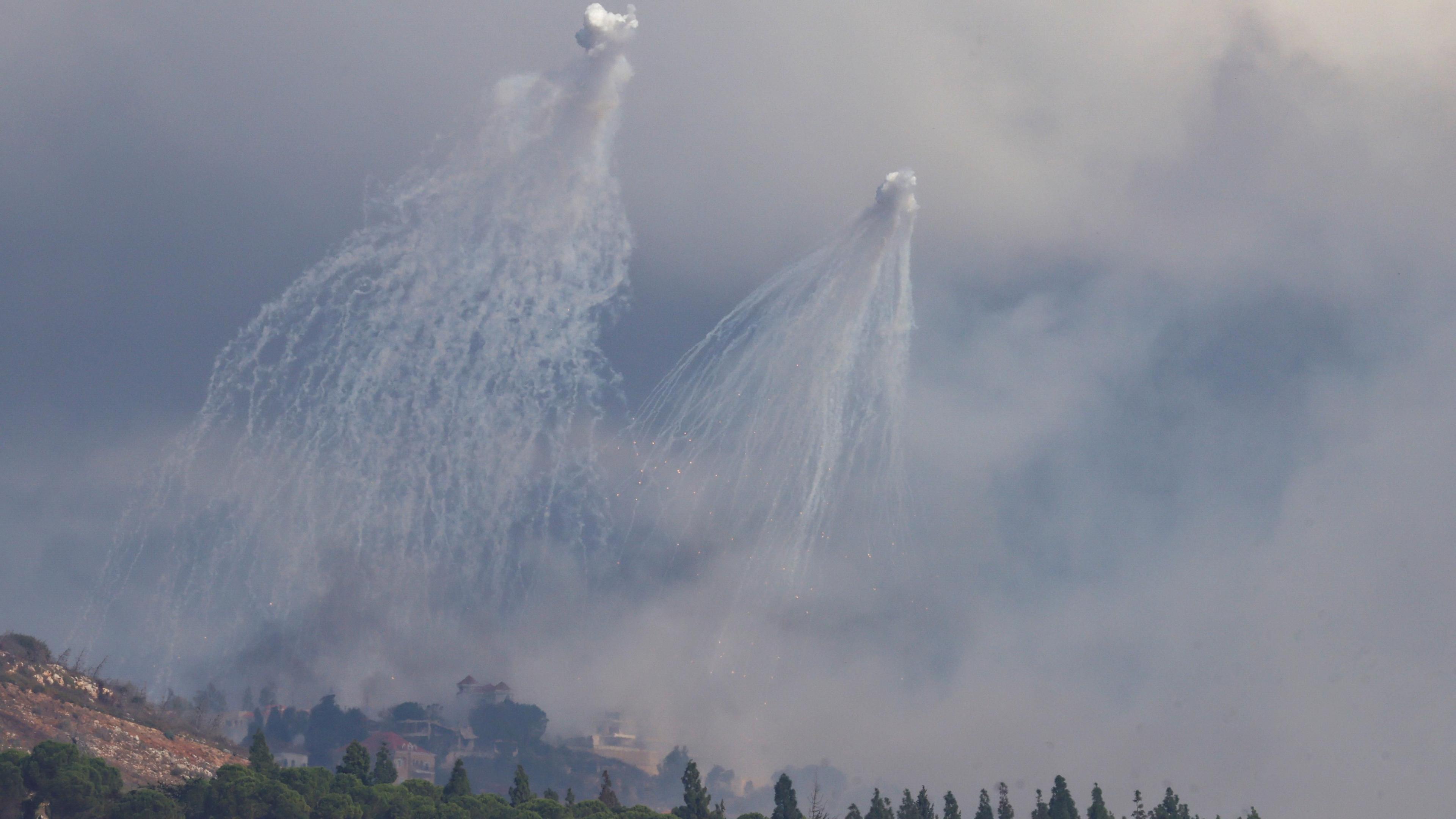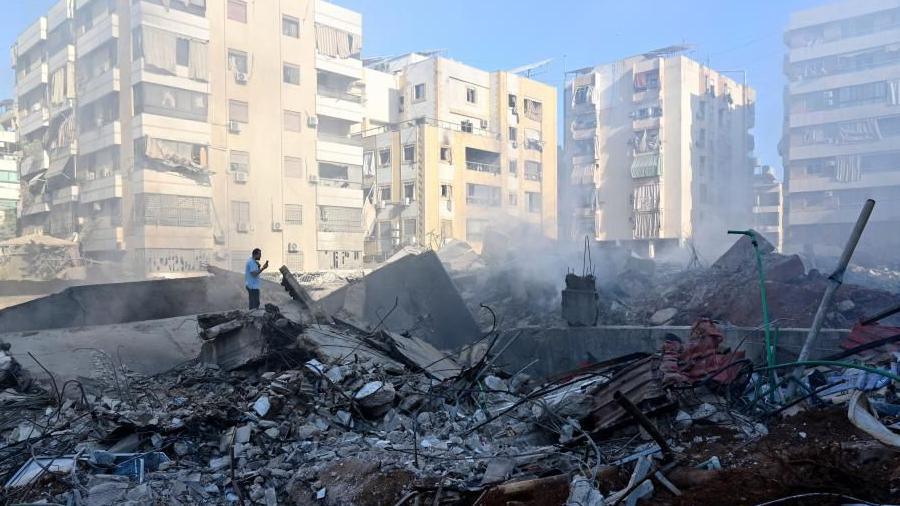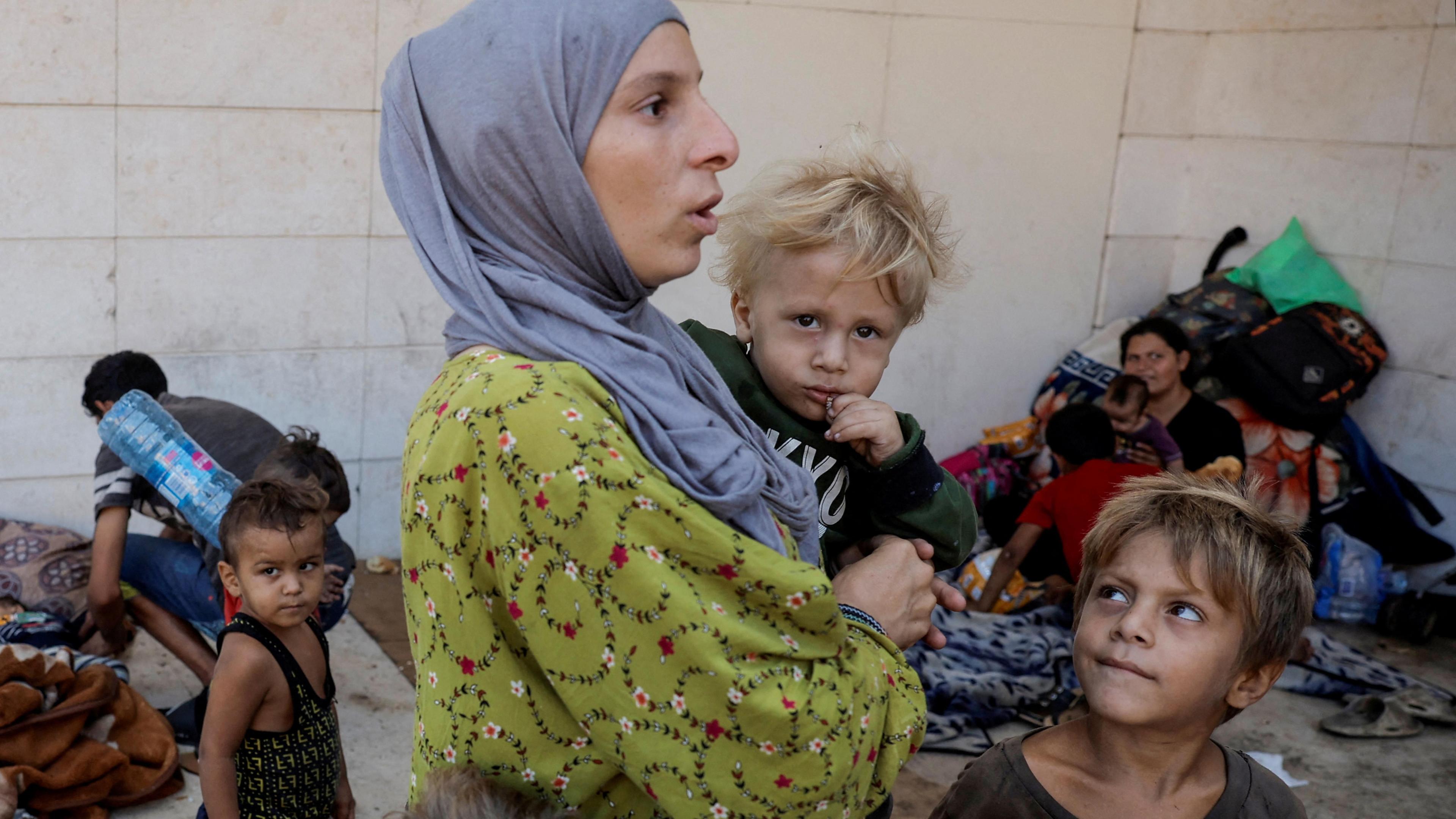How Israel-Hezbollah conflict escalated to a ground invasion

Israeli artillery targeted Lebanese border villages opposite Kiryat Shmona on Tuesday
- Published
Israel says it has launched a ground invasion in southern Lebanon against the armed group Hezbollah, marking another significant escalation of their long-running conflict that has heightened fears of a regional war.
The Israeli military said troops were carrying out “limited” raids in villages near the border, as aircraft continued to conduct intense air strikes throughout Lebanon.
It follows weeks of heavy blows by Israel against the Iran-backed Shia Islamist military and political organisation, including the killing of its leader Hassan Nasrallah.
Israel has gone on the offensive after almost a year of cross-border hostilities sparked by the war in Gaza, saying it wants to ensure the safe return of residents of border areas who have been displaced by Hezbollah attacks.
Although Hezbollah has been weakened, it remains defiant. The group is continuing to fire barrages of rockets into northern Israel and has said it is ready for the next battle.
Here’s what we know about the latest developments.
Israeli troops begin their first invasion of Lebanon in almost two decades
BBC Middle East correspondent Hugo Bachega in Beirut says Lebanon woke up to the news that Israel had launched a ground operation in the south - something that felt almost inevitable in the last few days.
The fear is that this could be the beginning of a wider campaign against Hezbollah, which fought a month-long war war with Israel in 2006.
In a brief statement put out early on Tuesday, the Israeli military announced that troops backed by aircraft and artillery had begun “limited, localised and targeted raids against Hezbollah terror targets” in border villages, saying they posed an “immediate threat” to northern Israeli communities.
According to BBC Middle East Correspondent Lucy Williamson in northern Israel, helicopters and jets flew low across this border overnight, to the regular crump of artillery and occasional loud explosions. And by the morning, fields a few miles from the border that had been full of dozens of tanks were emptying.
The military did not say how many troops were involved or how far it was preparing to push into Lebanese territory. However, a senior security official told the BBC that this was “not numbers of a large ground invasion” and that the troops had so far only gone as far as “very close walking distance”.
But sending ground troops even a short distance into Lebanon carries significant risks. Hezbollah, which is well armed with anti-tank missiles and mines, has been preparing to meet Israeli forces on that terrain for years.
Hezbollah says its fighters are ready to confront any invasion
On Tuesday, Hezbollah spokesman Mohammed Afif denied that Israel troops had crossed into southern Lebanon and stated that there had been “no direct ground clashes”.
But he added that the group was “ready for a direct confrontation with the enemy forces that dare or attempt to enter Lebanese territory and to inflict the greatest losses on them”.
Hezbollah also fired more rockets and missiles into Israel - attacks that Mr Afif said were “only the beginning” of its response to Israel’s attacks.
Sirens sounded several times in the border town of Metula, where Hezbollah said its fighters had targeted Israeli troops with artillery and rocket fire without mentioning any incursion.
The group also claimed it had fired missiles towards two Israeli intelligence bases in the central Tel Aviv area. Paramedics said two people were injured on a highway near Kafr Qasim.

Several buildings were levelled in the Israeli air strike that killed Hezbollah leader Hassan Nasrallah
Hezbollah is already reeling from a series of devastating attacks
Israel has inflicted huge damage on Hezbollah in recent weeks, killing more than a dozen top commanders and apparently destroying thousands of weapons in air strikes. It was also blamed for the exploding pager and walkie-talkie attacks that left thousands of Hezbollah members maimed, blinded or killed.
However, BBC International Editor Jeremy Bowen says the killing of Hassan Nasrallah in an air strike on Beirut’s southern suburbs on Friday is the biggest blow of all.
For more than 30 years, he was the beating heart of Hezbollah. With the help of Iranian funding, training and weapons, he turned it into a military force whose attacks led Israel to end a 22-year occupation of southern Lebanon in 2000 and which fought Israel to a standstill during a month-long war in 2006.
For Israel, Nasrallah’s killing is a huge victory. In a defiant speech at the UN on Friday, Israeli Prime Minister Benjamin Netanyahu asserted that Israel was “winning” the war against enemies who wanted to destroy it. By then, he had authorised the strike that killed Nasrallah.
Lebanon says hundreds have been killed and up to a million displaced
Prime Minister Najib Mikati warned on Tuesday that Lebanon was facing "one of the most dangerous phases of its history".
He said about a million people - a fifth of the population - had fled their homes “because of the devastating war that Israel is waging on Lebanon”.
The Lebanese health ministry said more than 1,200 people had also been killed, including dozens of children and women, over the past two weeks.
Authorities are struggling to assist everyone, with shelters and hospitals under pressure.
Israel says it is hitting Hezbollah sites, including weapons stores and ammunition dumps, and accused the group of using civilians as human shields.
But BBC senior international correspondent Orla Guerin says that is disputed by residents of the central Bekaa Valley, a Hezbollah stronghold that has been bombed repeatedly in the past week.
The medical director of the local Rayaq hospital also told her that all of the casualties it had treated had been civilians.

Lebanon's prime minister said it was seeing the largest displacement in the country's history
Efforts to de-escalate the conflict have failed
US President Joe Biden welcomed Hassan Nasrallah’s killing.
And after the Israeli incursion began, US Defence Secretary Lloyd Austin released a statement saying he agreed with Israel on the “necessity of dismantling [Hezbollah] attack infrastructure along the border”.
However, Mr Austin also reiterated that “diplomatic resolution is required” to ensure the safety of civilians “on both sides of the border”.
BBC state department correspondent Tom Bateman says the Israeli decision to escalate sharply the conflict with Hezbollah struck a potentially fatal blow to US President Joe Biden’s entire strategy of the last 11 months - to try to stop the war in Gaza engulfing the region.
Biden has said he is boosting the US defensive posture in the Middle East, while the Pentagon has warned Iran-backed militias not to try to use this moment to attack US bases.
Despite the earlier US attempts to rein in the Israeli leader and coax Hezbollah to a truce, Netanyahu has signalled strongly that he will act as he sees fit, whatever the pressure from Washington.
Hezbollah and Iran are considering how to respond
Hezbollah still has thousands of fighters, many of them veterans of combat in neighbouring Syria’s civil war, as well as a substantial arsenal of missiles, many of them long-range, precision-guided missiles that could reach Tel Aviv and other cities.
BBC security correspondent Frank Gardner says there will be pressure within its ranks to use those missiles before they get destroyed, but a mass attack on Israel that kills civilians could trigger a devastating response.
The assassination of Nasrallah was also a huge blow to Iran, hitting at the heart of the regional network of allied, heavily armed militias known as the “Axis of Resistance” that is key to its deterrent strategy against Israel.
On Sunday, Israeli jets struck infrastructure in Yemen’s Red Sea port city of Hudaydah in response to recent missile and drone attacks by the Iran-backed Houthi movement.
Iran could ask the Houthis and other groups to step up their attacks on both Israel and US bases in the region. But whatever response it chooses, it will likely calibrate it to be just short of triggering a regional war that would draw in the US and which it could not win.